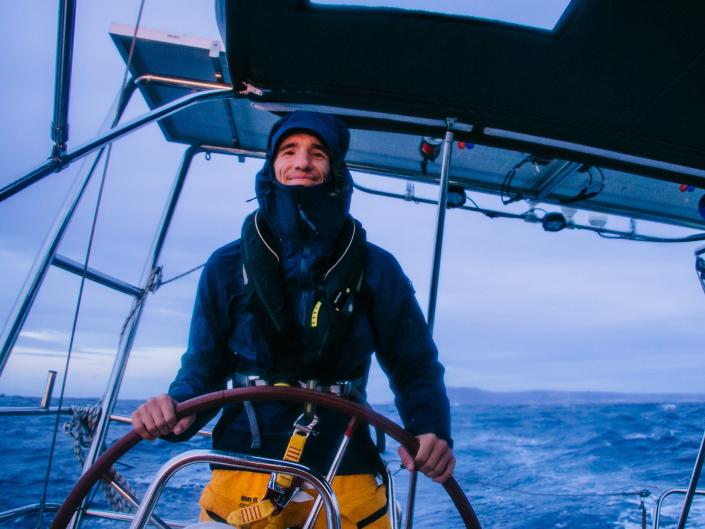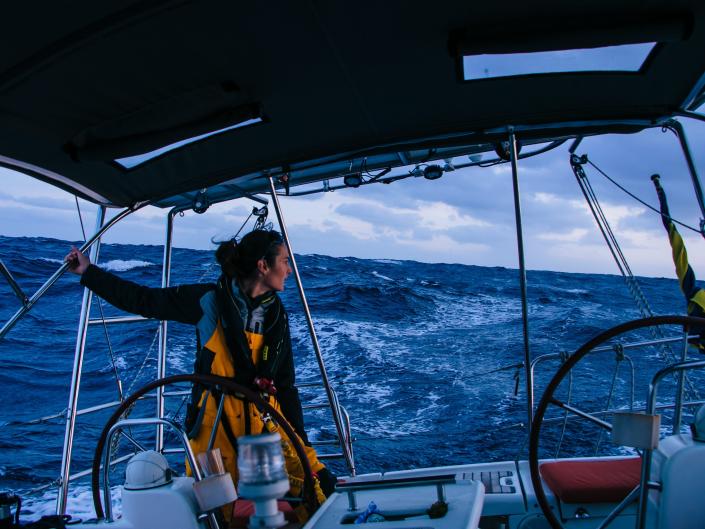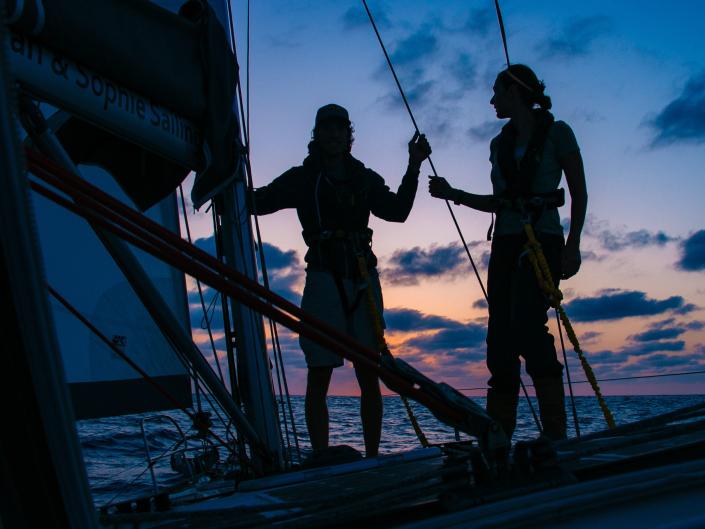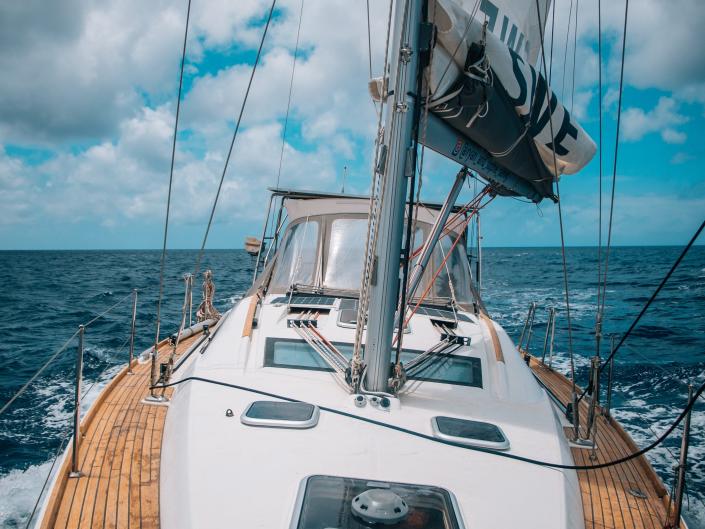-
Ryan Ellison and Sophie Darsy have lived on a 40-foot sailboat called the Polar Seal for six years.
-
A perk is making friends around the world — but downsides include travel fatigue and costs.
-
“We have more lows than highs, but the highs are so high it makes the life worth it,” Ellison said.
Ryan Ellison and Sophie Darsy bought a sailboat together shortly after they first started dating in 2015.

The couple, who document their travels through their Instagram, Ryan & Sophie Sailing, where they have more than 21,000 followers, told Insider they were dating for three months before pursuing the idea of swapping life on land for one on the sea.
In early 2016, it all became real when they spent $95,000 on a sailboat they renamed the Polar Seal.
But in the six years that followed, they said they’ve had to come to terms with the reality of calling the ocean home, which isn’t always as glamorous as it seems. Ellison, 40, said: “We have more lows than highs, but the highs are so high it makes the life worth it.”
A perk about the sailboat is that you really get to know local cultures, which is harder to do when you travel by plane, the couple said.

Unlike when you travel by plane, Ellison said arriving in a new country via sailboat means you are quickly immersed in the local culture.
“When you’re a tourist and you travel by airplane, it’s very easy to segregate yourself from those realities of places you go,” he said. “For us, it’s just impossible because when we land in the place, sometimes we don’t get to do the tourist stuff right away.”
Instead, they have to visit the customs dock, or find local help if anything on the Polar Seal needs repairing. “We get thrown into the culture very quickly,” he said, adding that it’s totally unique to life on the sea.
Another benefit they mentioned is the bonds you make with other sailors, who you end up bumping into at various ports all over the world.

Friendships among people who travel by sea develop strong and fast. “You pull in an anchorage, you’re going to meet someone, and literally that night you might be depending on them to save your home if your anchor drags,” Ellison said.
And even though people on land live in closer proximity all the time, Darsy, 35, said there’s “a lot of solidarity” on the sea that’s harder to find on land. But while you can get super close with the people you meet along the way, it could be years before you see them again.
Ellison used his birthday as an example where they would invite people they met in port to join. “This person comes on my boat and celebrates my birthday and gives you a gift. And then the next week they’re gone and you might not see them for two years,” he said.
But the spontaneity of the reunions is what makes it all so great, they said.
Having a first-row seat to some of the most awe-inspiring scenes from the natural world isn’t so bad either.

The couple have witnessed first-hand the awesome power of nature out in the middle of the ocean, in places they wouldn’t have been without having a floating home.
An example that quickly came to mind for Darsy was when she said they were coming out from the Mediterranean after spending a year sailing there, two years into living on the sea full-time.
“The sea was calm. There was no wind,” she said. “The water was like oil and the colors of the sunset were reflecting in the water and it created this painting of red and orange and purple, and it was amazing. And then all of a sudden, dolphins start to jump in front of the sunset.”
Then suddenly, there was a bioluminescence lighting up the water, especially when the dolphins were chasing thousands of fish around the boat. Although it was impossible to capture on camera, she said it felt like they were in the 2009 movie “Avatar.”
Tough moments can quickly turn around, which makes life on the sea exciting.

A bad or stressful moment on the sea can turn around in a flash, both Darsy and Ellison agreed. A memory they said captures this best is the time they sailed a challenging route through islands in Guadeloupe, when Ellison said he grabbed Darsy’s camera to try to take some footage.
“Sophie and I were just bashing in these waves,” he said. Attached to the camera was a $400 microphone, which ended up getting caught in the wind and flying off before their eyes.
“But then maybe five minutes later, we looked off the side of the boat and a huge whale jumped out of the water,” he added. “It went from us losing this gear and having a really bad time and knowing we had hours of this crap left, to this massive natural animal just popping up next to us that most people don’t get to see.”
Equally, all the uncertainty that comes with sailing makes the couple long for the stability of land, they said.

Darsy said she often misses the stability and “predictability” of land because “boat life by definition is unpredictable.”
“There are so many nights that we are sleeping and we are up in the middle of the night because something is moving on the boat, or something doesn’t feel right, or you are stressed because this tropical storm is coming,” Ellison added. “There is just a lot of days where I’m like, ‘I want to be in a house that doesn’t move and isn’t trying to kill me.'”
Spending so much time away from friends and family also makes them miss mundane activities, like going to brunch.

As much as they love the freedom and the adventure, the couple said that boat life can be exhausting, both physically and mentally. “It’s very intense to live on a boat and to travel the world,” Darsy said.
She said that in their experience, travel fatigue is the real deal, which makes them long for home comfort and their loved ones. “At the end of the day, we are all social creatures and I long for my group of girlfriends who I go to brunch with every Sunday,” she said.
Speaking of home comforts, things they say they’ll take for granted again on land include toilets that flush automatically.

“Something that we take for granted, on our boat you have to flush manually,” Darsy said, which means that they have to pump the waste away in the toilet. “You literally have to have a workout, every time that you want to go pee.”
The septic situation on the boat also means that they have to service the toilet by hand every four months, Ellison said, which involves crawling inside the tank and changing “all the dirty bits.”
“We take it for granted that we can flush a toilet, with the press of a button,” Darsy said. “That’s nice.”
Boat life can be incompatible with their jobs, which they need to do to afford the lifestyle.

“It’s so inconvenient to live on board and everything is so inefficient and takes so much more time,” Darsy, who runs their YouTube channel and does consulting on the side, said. This means that sometimes they’re working upwards of eight hours a day past their normal working hours just ensuring everything is running smoothly on the vessel.
“Two weeks ago we had a tropical storm come over us,” she said. “For a full 24 hours, we didn’t sleep.”
“You can’t do anything when it’s like that,” she said. But Darsy and Ellison, who said they make a joint income of $5,000 a month, say they need to push through it. “My clients still expect me to participate in meetings and to deliver,” Darsy said.
Living on a sailboat is way more expensive than they expected when they first started.

“I would say the first thing we discovered is that the sailboat dream of it being free or cheap was not true,” Ellison said.
In fact, he said marina bills average at anywhere from $500 to $1,000 per month, and can be triple that during peak seasons in the summer in Europe. When they are just at anchor, most of their costs come from food bills — but the price of food can really vary depending on where they are.
In Bermuda, they said, trips to the grocery store every four days can be upwards of $100. They also have their life insurance and phone bills, on top of the maintenance cost of operating the boat.
“We plan on our operating costs for the boat to be, with maintenance and everything, between about 10% to 20% of the whole value a year,” Ellison said, so theirs is between $10,000 and $20,000 a year.
Darsy and Ellison spend most of their time isolated from friends and family on the Polar Seal, which doesn’t leave them much option if they need space.

The reality of living and working together pretty much 24 hours a day, every day, is that it inevitably can cause friction in a relationship, the couple said.
“You become everything for your partner. So Ryan is my romantic partner but he’s also my best friend, and my confidant, and my therapist, and my nurse, and my colleague,” Darsy said. “And you have to fill all the roles for each other and it doesn’t always work to jump from one role to the other at a moment.”
“Don’t ever go into this life thinking that it’s going to save your relationship. Because if anything, it wears it more than life on land,” she added. What helps for them is having a couples therapist and also taking breaks, sometimes up to two months, on land because it’s near impossible to have any real alone time on the 40-foot-long boat, they said.
While life on a sailboat might look glamorous, it’s opened Ellison and Darsy’s eyes to tough realities like the migrant boat crisis in Europe.

A huge lesson the couple said they really came to appreciate this year is how not everyone is on the sea for pleasure. This all came to head in January when Ellison attempted his first-ever solo crossing of the Atlantic. One night, he was called by the Coast Guard to assist in the rescue of 300 people on rafts attempting to seek asylum in Europe, they said.
To know that migrant raft crossings exist, in which thousands of people each year drown, according to the UN, is different from witnessing it first-hand, Darsy said.
“Being asked to assist with something by yourself was really, really challenging for me,” Ellison said. “Then to see that and the emotions that it draws of seeing about 50 people on a raft that are probably going to die if they don’t get rescued. It’s just emotionally draining.”
For their own well-being and their shared future, the couple hopes to strike a better balance between land and sea.

For their own sanity, Darsy said she and Ellison spend an average of one to two months on land each year.
But together, the couple said they hope to establish a bit more balance between boat life and life on land by buying a home on the East Coast of the US later this year.
The goal is to sail half the year, and be on land half the year, which Ellison said they consider to be “a little bit more of a healthy lifestyle.”
“Maybe there are some years that we don’t sail much at all, in other years that we do a full year out. But at least we have the option to go back to a place,” he said.
Read the original article on Insider

















Discussion about this post